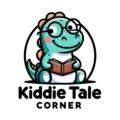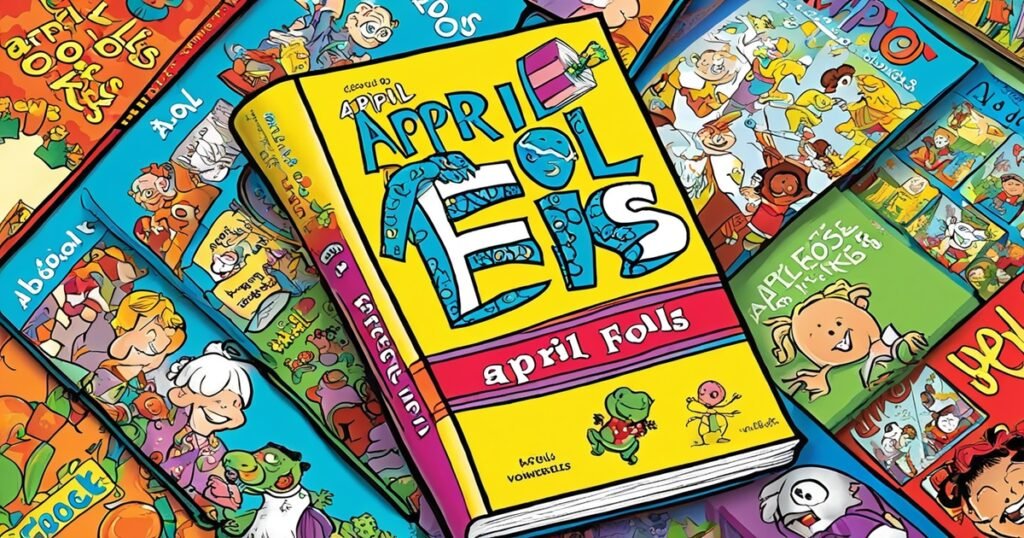Finding the perfect balance in 7th grade reading materials can be a challenge, yet 200 page books for 7th graders strike just the right note. These books are substantial enough to cover a gamut of engaging stories and themes, but concise enough not to intimidate those who might be hesitant to commit to longer novels. Whether these young teens are voracious readers searching for their next adventure or are more reluctant, needing that gentle nudge into the world of literature, a well-chosen 200-page book offers a bridge into the vast world of stories.
With educators and parents constantly on the lookout for recommended books for 7th graders, it’s clear that this specific book length serves as an excellent tool to foster a love for reading. From fantastical tales that whisk readers away to realms of imagination to contemporary narratives that reflect the real-life experiences of 7th graders, each book promises a journey of discovery and enlightenment within a mere few hundred pages.
Table of Contents
- Key Takeaways
- Why 200 Page Books Are Ideal for 7th Grade Readers
- Choosing the Right Content: Age-Appropriate Books for 7th Graders
- Addressing the Challenge: Engaging Reluctant Readers
- Exploring New Worlds: Fiction Books for 7th Graders
- Expanding Horizons: Non-Fiction Books for 7th Graders
- Classic Adaptations: Timeless Stories Retold for Middle Schoolers
- Celebrating Differences: Diverse and Inclusive 200 Page Books
- 200-page books for 7th graders: A Gateway to Advanced Reading Skills
- Curating a Versatile 7th Grade Reading List
- Conclusion
- Source Links
Key Takeaways
- 200 page books for 7th graders offer a welcoming introduction to more mature reading materials.
- These books cater to a variety of interests, ensuring there’s something for every kind of reader in the 7th grade.
- The length of these books helps maintain a 7th grader’s interest without leading to fatigue or overwhelm.
- Recommended books for 7th graders within this page range can facilitate a smoother transition to more advanced literature.
- Selecting engaging stories within this length supports the development of consistent reading habits.
- Well-chosen narratives in these books can help young readers build empathy and understanding through diverse characters and situations.
Why 200 Page Books Are Ideal for 7th Grade Readers
The transition from childhood to teenage years can be filled with growing pains, especially when it comes to reading preferences. For 7th graders, captivating and age-appropriate books come in various lengths, but those totaling around 200 pages seem to hit a sweet spot. These books for 7th graders not only bridge the gap between shorter children’s texts and daunting young adult (YA) novels but also cater to a developmental phase where attentiveness and comprehension are burgeoning. At this ideal length, 200-page books align well with the attention spans of 7th graders, keeping them immersed in a narrative without the intimidation often brought on by thicker volumes.
To understand why 200-page stories resonate with students at this level, it’s essential to look at their classroom-based reading frameworks. A tailor-made reading list for 7th graders tends to include works that can typically be completed in reasonable reading sessions, allowing for consistent progress and comprehension checks without inducing fatigue or discouragement. These books offer a sense of achievement upon completion, encouraging readers to explore further.
Moreover, the content within these concise works is thoughtfully curated to match the intellectual curiosity and emotional maturity of young adolescents. Providing complete narratives that stimulate but don’t overwhelm, 200-page grades are ideal stepping stones for more extensive and complex literary works in the future.
As educators and authors continue to understand and appreciate the specific needs of middle-school readers, the list of recommended books for 7th graders, fitting within this page range, grows in diversity and relevance. These books often come packed with themes that challenge readers to think more deeply about the world and their place within it, offering invaluable life lessons through the powerful medium of storytelling.
In summary, 200-page books are equivalent to the Goldilocks principle in literary form for 7th graders: not too long, not too short, but just right for their developmental stage. They satisfy a voracious reader’s appetite and provide a gentle nudge to the more reluctant reader, firmly establishing themselves as invaluable tools in any educator or parent’s arsenal for cultivating lifelong readers.
Choosing the Right Content: Age-Appropriate Books for 7th Graders
Selecting the right reading material for middle school students often involves a careful balance of understanding their intellectual and emotional development, as well as ensuring that the books align with their rapidly changing interests. When it comes to seventh graders, this becomes particularly crucial as they are at a transitional stage where appropriately challenging content can substantially encourage personal growth and aid them in their educational journey.
Understanding 7th Graders’ Intellectual and Emotional Development
Seventh graders typically exhibit a wide spectrum of developmental stages, some leaning towards deep intellectual curiosity, while others might find themselves navigating complex emotional growth. Middle school books that cater to this intricate phase must weave together both complexity of thought and emotional relevance. It’s about hitting that sweet spot where educational books for 7th graders serve not just as a means for information dissemination but also as a mirror reflecting their personal experiences and emotions.
The Role of Middle School Books in Fostering a Love for Reading
The books that educators and parents choose to put in the hands of 7th graders can have a profound impact on nurturing a love for reading. Offering a mix of both fiction books for 7th graders and non-fiction books for 7th graders can entice a wider range of reading preferences. A well-rounded selection helps in formulating a strong foundational appreciation for literature that might persist into adulthood.
| Genre | Fiction | Non-Fiction |
|---|---|---|
| Example Topics | Adventure, Mystery, Sci-Fi, Fantasy | Biography, Science, History, How-To |
| Benefits | Develops imagination, empathy, and creative thinking | Builds knowledge, provides real-world context, and enhances understanding |
| 7th Grader Engagement | High – Stories that resonate with their personal journey | Moderate to High – Topics that spark curiosity about the world |
| Skill Building | Vocabulary expansion, narrative understanding | Critical thinking, analytical skills |
In line with these ideas, it is critical that the selection process for middle school books involves 7th graders themselves. Engaging them in choosing what they read empowers them and instills a sense of agency over their learning and recreational reading. Hence, a curated list of educational books for 7th graders should not only fulfill curriculum standards but also allow students to dive into books that they find personally meaningful.

In conclusion, the role of middle school books extends beyond simply providing content. These books can act as pivotal tools to spark a lifetime of reading, bringing about an understanding and love for literature that can profoundly shape 7th graders’ intellectual and emotional growth.
Addressing the Challenge: Engaging Reluctant Readers
The world of middle-grade literature teems with diverse narratives and intriguing characters designed to captivate young minds. However, one of the most formidable obstacles in 7th-grade education is to spark a love for reading among students reluctant to turn the pages of a book. The careful selection of engaging reluctant readers with the right content can dramatically shift their perception of reading from a mundane task to an exhilarating journey of discovery.
The Link Between Book Length and Reading Motivation
One crucial factor that influences a student’s willingness to read is the perceived magnitude of the undertaking. A looming 400-page novel can appear as an insurmountable challenge to a hesitant reader, causing an immediate retreat. Conversely, 200 page books for 7th graders offer a less intimidating alternative that encourages students to dip their toes into the literary pool without fear of the deep end. The length of these books aligns perfectly with the attention span and reading proficiency of younger teens, making them ideal tools in transforming a reluctant reader into an avid one.
Short but Impactful: 200 Page Books as Confidence Boosters
Scholastic achievements often go hand-in-hand with confidence, a trait that can be cultivated through the completion of short, yet enriching tales found within 200 page books for 7th graders. These works provide achievable goals that, once reached, foster a sense of accomplishment and the desire to explore further. Additionally, they serve as confidence boosters, empowering students with the knowledge that they can, indeed, complete a book and enjoy its narrative arc to the fullest.
Educational books for 7th graders falling under this accessible range can be instrumental in building the foundational reading skills necessary for tackling more complex texts. They offer a platform for students to improve their vocabulary, enhance their understanding of story structures, and gain a deeper appreciation for literature without becoming overwhelmed.
The key to unlocking the interest of reluctant readers lies not only in choosing books of the right length but also in curating content that resonates with their personal experiences and interests. When these two elements combine, educators and parents can watch as previously unenthusiastic readers discover the joy and empowerment found within the pages of a good book.
Through this strategic approach to book selection and reading encouragement, we begin to address the challenge of engaging reluctant readers. The mission is to transition them from viewing reading as a chore to recognizing it as a source of pleasure, knowledge, and self-assuredness, shaping them into lifelong readers and learners.
Exploring New Worlds: Fiction Books for 7th Graders
Delving into the pages of captivating fiction books allows 7th graders to traverse unknown lands and live vicariously through the enthralling lives of characters. These literary creations serve as a gateway to limitless imagination and adventure, aiding young readers in navigating the complexities of middle school life.
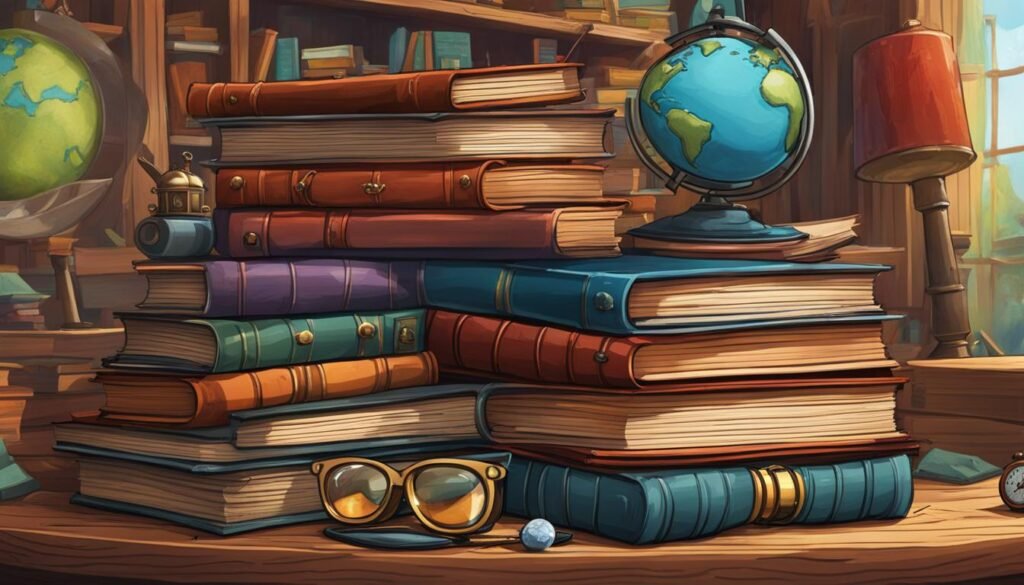
The importance of including a variety of fiction in a reading list for 7th graders cannot be overstated. The power of these narratives lies in their ability to stretch beyond the mundane and kindle the flames of curiosity and wonder within the young adolescent mind.
Adventure and Fantasy: Exciting Genres to Captivate Young Minds
Adventure and fantasy genres stand out on the shelves of middle school books as they whisk readers to realms beyond their wildest imaginations. These genres confront heroes with daunting quests, mythical creatures, and worlds woven with magic, showcasing the boundless creativity of human storytelling.
Realistic Fiction That Reflects the 7th Grade Experience
On the other end of the spectrum, realistic fiction grounds itself in the everyday experiences of 7th graders. These fiction books for 7th graders often grapple with the social and personal challenges commonly faced during this pivotal growth phase. Whether it’s navigating friendships, dealing with family issues, or confronting the pressures of school life, the characters within these stories offer reflections that resonate deeply with young readers.
Meticulously chosen books merge spine-tingling escapades with lifelike scenarios, forming a balanced reading list for 7th graders that is both enthralling and relatable. These books provide not just an escape, but also a friend; not solely a lesson, but also an ally in the journey of adolescence. Therefore, it is essential that educators and families curate this list with care, ensuring every book opens a door to a new world that awaits exploration by eager young minds.
Expanding Horizons: Non-Fiction Books for 7th Graders
In an age where cultivating critical thinking is paramount, non-fiction books for 7th graders play a pivotal role in broadening their understanding of the world. Categories like biographies, histories, sciences, and discoveries not only supplement classroom learning but stimulate curiosity and personal growth. This array of educational books for 7th graders acts as a lens through which young minds can examine real-world scenarios, drawing parallels to their experiences and gaining newfound perspectives.
Biographies and Histories: Learning from Real-Life Stories
By delving into the lives of remarkable individuals and momentous events through biographies and historical narratives, students gain access to life lessons that transcend time and geography. These non-fiction books for 7th graders not only recount tales of perseverance, innovation, and leadership but also provide rich context for the present by illuminating the past.
Science and Discovery: Feeding Curiosity Beyond the Classroom
The quest for knowledge often leads students beyond the traditional subjects encountered at school. Science and discovery-themed books satiate this thirst by offering answers to the hows and whys of the natural world. Cultivating a culture of inquiry, such recommended books for 7th graders empower students to explore concepts and inventiveness that have shaped our understanding of the universe.
Together, these genres contribute to a well-rounded education, ensuring that students are not just consumers of facts, but also thoughtful participants in a world that values wisdom and insight.
Classic Adaptations: Timeless Stories Retold for Middle Schoolers
Rooted in tradition yet revitalized for today’s young readers, classic adaptations have become essential components of 7th grade reading materials. These retold tales stay true to the original’s intent while being reshaped to speak to a younger audience, thus making them age-appropriate books for 7th graders. By maintaining the core narratives that have been cherished for generations, these adaptations serve as a valuable bridge between historical literature and present-day students’ lives.
One of the main goals of offering classic adaptations is to introduce middle schoolers to the legendary stories that have shaped literary landscapes. Writers and educators collaborate to create versions that preserve the timeless themes of the classics, yet they simplify the language and context to match the comprehension levels of young readers. In doing so, they ensure that the essence and moral lessons of the original texts remain intact.
When it comes to selecting classic adaptations for middle school libraries or classrooms, the process involves more than merely toning down complex plots. It encompasses a thoughtful reimagining that enriches the story for a contemporary audience, often by adding relatable scenarios or settings that resonate with today’s youth, without compromising the story’s integrity.
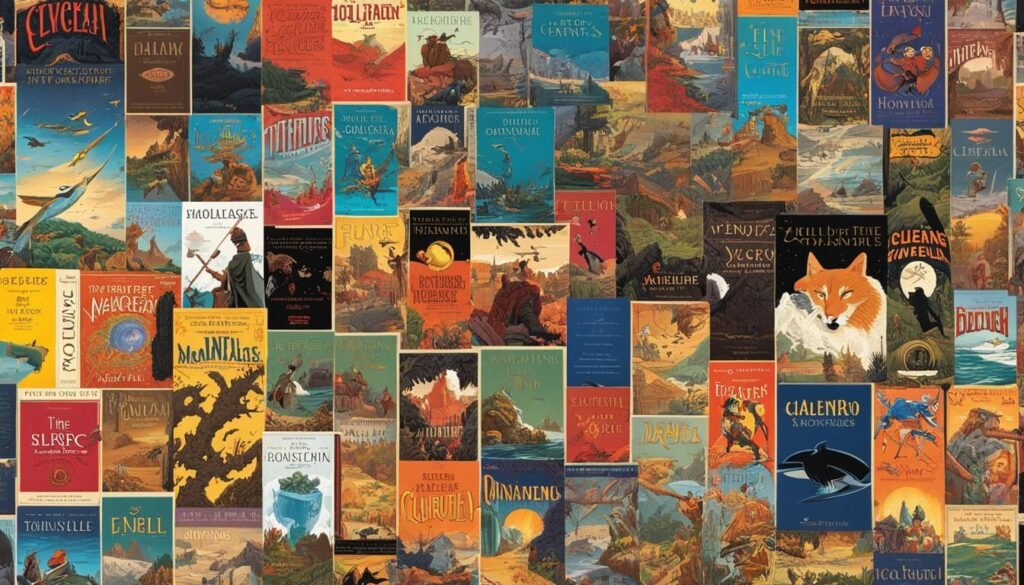
Moreover, these stories often harness the power of illustration to aid in comprehension and add a sensory dimension that captivates readers. Visual representations alongside text can make the narratives more accessible, further encouraging 7th graders to engage with literature from a different era. Dynamic retellings bring not only characters but also the sociocultural context of the period to life, making it easier for students to grasp and appreciate these longstanding works.
Below is an illustrative example showcasing how adaptations of classic literature can be transformed into suitable 7th grade reading materials:
| Original Classic | Adaptation Approach | 7th Grader Appeal |
|---|---|---|
| Moby-Dick | Simplified language, focused narrative arc | High-seas adventure taps into imagination |
| Pride and Prejudice | Updated dialogue, relatable character dynamics | Timeless social interactions resonate with peer experiences |
| The Odyssey | Streamlined plot, illustrated mythological elements | Epic journey with monsters and heroes aligns with fantasy interests |
Relying on the wisdom and relevance of classical literature, these age-appropriate books for 7th graders connect history with the present. They challenge students to consider enduring human experiences—love, bravery, and perseverance—through stories that have already stood the test of time. As such, classic adaptations not only serve academic purposes but also foster a deeper understanding and respect for literature from past eras.
Ultimately, the success of these storied classics as part of 7th grade reading materials lies in their remarkable ability to remain relevant while adapting to the needs and interests of current students. The fact that these narratives continue to be told and retold is a testament to their enduring legacy—a true cornerstone of literary education for 7th graders.
Celebrating Differences: Diverse and Inclusive 200 Page Books
In the heart of middle school education lies the powerful role played by diverse and inclusive books, especially those suitable as books for 7th graders. These 200-page books are not mere stepping stones in reading development but pivotal in shaping young readers’ understanding of the world around them. By presenting a variety of cultures, experiences, and perspectives, 200-page middle school books foster a robust foundation for empathy and appreciation for diversity.
The colorful tapestry of narratives within these books ensures that every student finds characters and stories to which they can relate, as well as windows into lives different from their own. As such, educators and parents are recognizing the importance of including diverse and inclusive books in the curricula and home libraries to promote understanding and respect among young readers.
- Empathy Building: These books are instrumental in helping students to place themselves in another’s shoes, often going beyond their immediate circle of experiences.
- Cultural Awareness: They introduce 7th graders to a breadth of cultural backgrounds, fostering a global outlook and cultural sensitivity.
- Inclusivity in Action: These narratives pave the way for discussions about inclusivity, bringing theory into real and relatable scenarios.
Books for 7th graders that revolve around these principles not only make for an engaging read but also double as important educational tools. They provoke thought, ignite discussions, and push young readers to consider and appreciate the myriad ways in which people are different and yet fundamentally the same.
| Theme | Representation | Benefits |
|---|---|---|
| Cultural | Characters from diverse backgrounds | Broader worldview and reduced biases |
| Socioeconomic | Varied family dynamics and lifestyles | Increased social awareness and empathy |
| Gender Identity | Inclusive of all gender expressions | Supports self-identity and acceptance |
| Abilities | Characters with different abilities | Encourages understanding and inclusion |
The quality of middle school books that emphasize diversity and inclusion cannot be overstated. Not only do they play a crucial role in developing a love for reading, but they also subtly teach vital life lessons. As society continues to evolve, it is paramount that the literature offered to 7th graders evolves with it, ensuring that the stories read are reflective of a world rich in differences and brimming with individuals of all walks of life.
200-page books for 7th graders: A Gateway to Advanced Reading Skills
At the heart of a middle schooler’s literary journey are books that not only tell a great story but also facilitate the growth of sophisticated literacy skills. For 7th graders, the leap to more advanced reading skills is often bolstered by diving into engaging 200-page books. These texts, perfectly sized for tweens, serve as a crucible for expanding vocabulary and enhancing comprehension in a format that feels both achievable and stimulating. In an age where reading can seem like a challenge, these age-appropriate books for 7th graders make the quest for knowledge an inviting and rewarding experience.
Building Vocabulary and Comprehension Through Engaging Stories
Choosing the right reading material can have a profound impact on a student’s academic progression. The stories and characters found in 200-page seventh grade reading materials go beyond simple entertainment. They offer a rich lexicon of new words and concepts that are woven into the fabric of intriguing plots. By encountering these terms in context, students are more likely to integrate them into their own vocabulary. This natural expansion of language equips students with the tools they need to express themselves more succinctly, both verbally and in writing.
Discussion and Analysis: Encouraging Critical Thinking
Education extends beyond the acquisition of facts and figures. It is in the analysis and interpretation of literature that students exercise and develop their critical thinking skills. Engaging with the layered narratives found in 200-page 7th grade reading materials, students are encouraged to think more deeply about the text. This critical engagement paves the way for robust classroom discussions, personal reflections, and analysis that reach far beyond the final chapter of each book. These conversations are fundamental to fostering advanced interpretive skills and a deeper appreciation for storytelling, setting students on the path to becoming discerning readers.
By carefully selecting 200-page books that resonate with young teens, educators and parents lay down a cornerstone for the lifelong pursuit of literary enrichment. It’s not just about getting through the book, but about nurturing thoughtful, articulate, and insightful individuals equipped with advanced reading skills and a broadened understanding of the dynamic world around them.
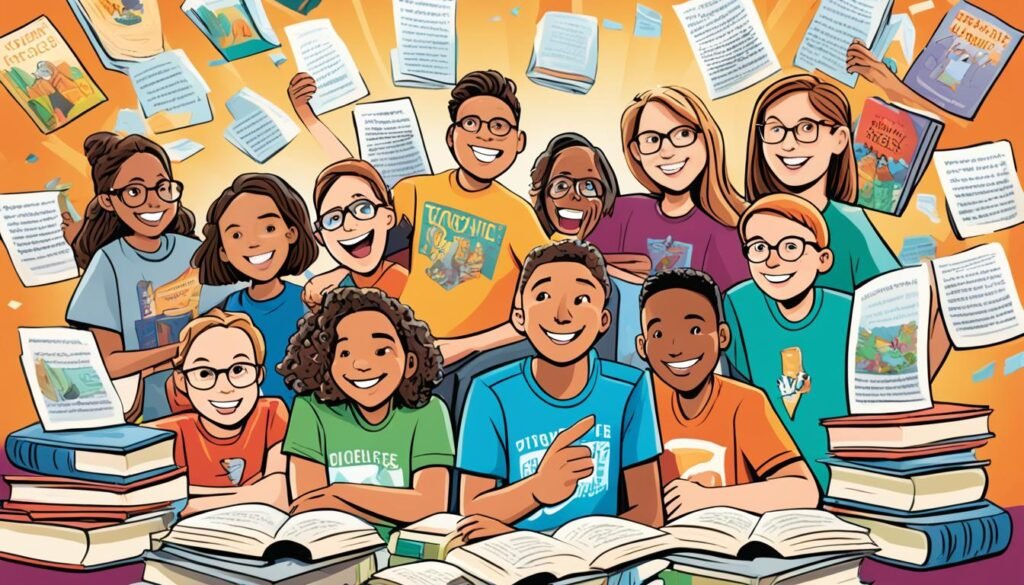
Curating a Versatile 7th Grade Reading List
Creating a versatile and dynamic 7th grade reading list involves merging a symphony of genres and themes. This well-rounded approach addresses individual student interests and fosters a more profound love for reading. A refined list includes classics and contemporaries, fact and fiction, poetry and prose—and everything in between. It’s not just about ticking boxes but about creating a gateway to an eclectic literary world that resonates with 7th graders, sparking their curiosity and encouraging deeper engagement with the text.
Incorporating a Mix of Genres and Themes
The hallmark of an impactful 7th grade reading list is its diversity, offering a range of books that include mystery novels that sharpen critical thinking, science fiction that expands imagination, historical fiction that brings the past to vivid life, and realistic stories that mirror the complex emotional tapestry of adolescence. This amalgamation ensures that books for 7th graders not only align with various reading levels and interests but also support their educational and emotional development.
“For every reader, there’s a book waiting to be discovered, a new world to be explored, and a story that speaks directly to them.”
In fostering an inclusive reading environment, it’s crucial to present narratives from an array of cultures and experiences. This inclusion enriches students’ understanding of the world around them and cultivates empathy. The ultimate aim is to create lifelong readers who not only find joy in books but learn about themselves and others through the diverse stories they encounter.
Reading Beyond the Classroom: Summer and Leisure Reading
While academic texts are fundamental, the scope of a 7th grade reading list stretches beyond the classroom walls. As students embark on their summer holidays or find downtime outside of school hours, leisure reading becomes a pivotal part of their growth. Encouraging a selection of leisure reading, including both light-hearted and thought-provoking narratives, keeps students immersed in the literary world all year round.
Summer reading, in particular, offers an exciting opportunity for 7th graders to delve into books they might not encounter during the school year. Emphasizing fun, adventure, and personal choice, this period is an open horizon for discovering new interests and indulging in longer, more complex stories without the pressures of academic assignments. It’s the perfect season to intensify their love for reading and enrich their vacation with adventures found between the pages of a good book.
- Adventure Stories: Engage the imagination with high-stakes quests and explorations.
- Comics and Graphic Novels: Combine visual art with storytelling, offering a different reading approach.
- Biographies: Highlight remarkable lives and achievements, inspiring students with real-world heroes.
- Poetry: Builds sensitivity to language and expression through rhythm and verse.
To ensure a balance, this blend shouldn’t just pique interest but also challenge reading abilities, pushing students slightly out of their comfort zone to incite growth without overwhelming them. The ideal reading list shifts effortlessly between enjoyable reads and those that enhance core skills, reinforcing learning in a manner that feels both natural and enjoyable.
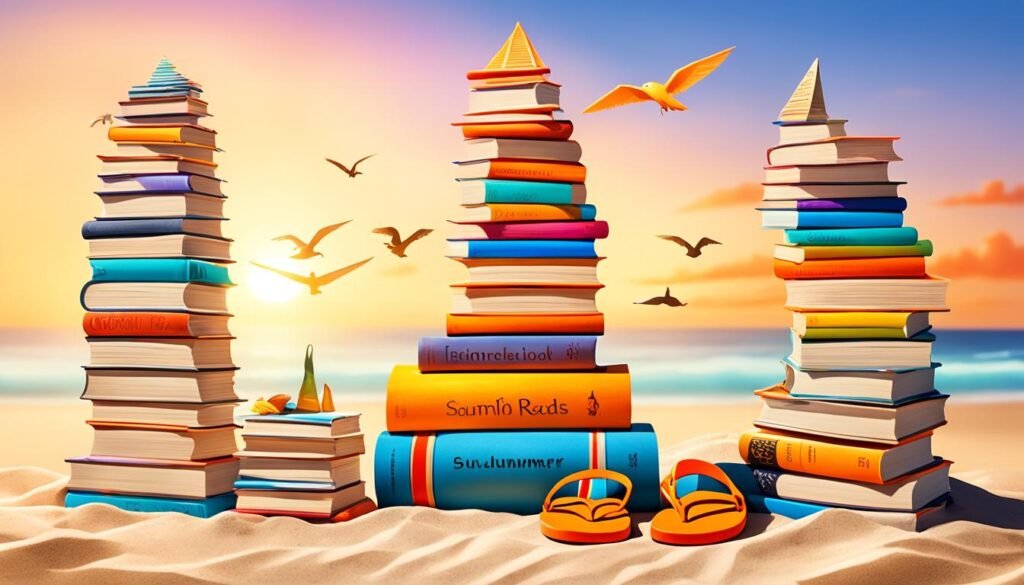
In conclusion, a well-crafted 7th-grade reading list is more than just a compilation of titles; it’s a thoughtfully designed set of literary experiences that engage, educate, and entertain, laying down the foundation for a lifetime of reading pleasure and intellectual enrichment.
Conclusion
In charting the course of a 7th grader’s reading journey, 200 page books for 7th graders have emerged as not just stepping stones, but as catalysts for cultivating a robust reading practice. These middle school books are crafted to capture the complexities and wonders of the world through a lens that is both accessible and resonant with young readers. Their narrative richness and diversity in themes make them ideal recommended books for 7th graders as they offer pivotal lessons while engaging budding imaginations.
The beauty of these carefully curated 200-page narratives is that they provide a library of experiences, ensuring that there is something for everyone. They support 7th graders as they gear up to navigate the deeper waters of literature, serving as confidence-building portals to expanded vocabularies, improved comprehension, and an overall passion for reading that can span a lifetime.
Ultimately, these middle school books stand as testaments to the transformative power of storytelling. They not only mirror the readers’ own lives but also introduce them to perspectives beyond their immediate realm, contributing significantly to their literacy development and empathy. As educators, parents, and stewards of knowledge, our role in guiding young readers towards these enriching works is paramount in shaping the informed, thoughtful world citizens of tomorrow.
FAQ
What makes 200 page books ideal for 7th grade readers?
200 page books are ideal for 7th grade readers as they offer a balanced length that is neither too intimidating nor too brief, making them perfect for sustaining young readers’ attention and interest. They provide depth and narrative complexity appropriate for this age group without being overwhelming, thereby positively contributing to their reading development and confidence.
How does understanding a 7th grader’s development help in choosing books?
Understanding a 7th grader’s intellectual and emotional development helps in selecting books that are both challenging and engaging. Age-appropriate reading materials connect with their experiences, cater to their curiosity and foster their love for reading. This understanding ensures that the books are not only entertaining but also contribute to their educational growth.
Why are middle school books important in fostering a love for reading?
Middle school books are important because they bridge the gap between elementary level simplicity and high school complexity. They often address themes and challenges relevant to young teens’ lives, which can resonate deeply and nurture an intrinsic desire to read. These books can lay the groundwork for an enduring passion for literature.
How do shorter books, like those with 200 pages, engage reluctant readers?
Shorter books, such as those around 200 pages, provide a sense of accomplishment upon completion, which can be a significant confidence booster for reluctant readers. They require a manageable time commitment, which helps in maintaining the interest of 7th graders who might feel daunted by longer texts. Consequently, these books can encourage them to read more frequently and develop their reading skills gradually.
What types of fiction books are most engaging for 7th graders?
7th graders are often most engaged by fiction books that fall into genres like adventure, fantasy, and realistic fiction. These stories offer excitement, the thrill of exploration, and scenarios that 7th graders can relate to, reflecting their own life challenges and experiences. Such books fulfill their need for both escapism and relevance.
Why are non-fiction books valuable for 7th graders?
Non-fiction books are valuable for 7th graders because they provide factual insights into various subjects such as biographies, histories, science, and discovery. These books meet the curiosity of middle schoolers and connect their in-class learning with the world around them, encouraging critical thinking and expanding their knowledge and perspectives.
What is the benefit of classic adaptations for middle school readers?
Classic adaptations introduce middle school readers to timeless tales with themes and language tailored to be accessible and appealing to their age group. These retold classics help bridge the gap between historical literature and contemporary young readers’ interests, allowing them to appreciate iconic stories that have shaped literary heritage.
How do diverse and inclusive books benefit 7th graders?
Diverse and inclusive books expose 7th graders to a variety of cultures, experiences, and perspectives. They promote empathy, understanding, and respect for differences. Such books help students see reflections of themselves and their peers within literature, which can be empowering and affirming during their formative middle school years.
How do 200-page books lay the foundation for advanced reading skills?
200-page books lay the foundation for advanced reading skills by offering narratives that are complex enough to challenge 7th graders’ vocabulary and comprehension without being excessively long. These books encourage analysis and discussion, prompting readers to think critically about what they read and to formulate their interpretations and responses to the text.
What should a versatile 7th grade reading list include?
A versatile 7th grade reading list should include a wide range of genres and themes to cater to different interests and expand literary experiences. It should incorporate fiction and non-fiction, classic and contemporary works, as well as culturally diverse literature. This approach ensures that there are choices for every reader, and it supports literacy development in a comprehensive way.
Are 200-page books suitable for summer and leisure reading?
Yes, 200-page books are highly suitable for summer and leisure reading. Their manageable length makes them perfect for travel or downtime without requiring a long-term commitment. These books can provide a pleasurable and fulfilling reading experience during breaks from the academic school year.
